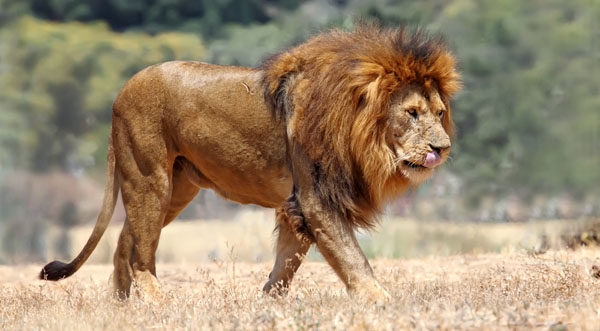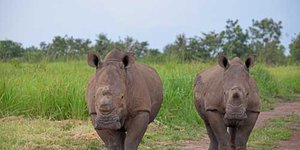Like this article?
Go on, give it a kudu!

Published on June 03 2013
Written by:
Fran
1147 views
The debate on whether trophy hunting can positively contribute to conservation efforts is a long and unresolved one. Both sides of the argument have firm followers. Ever since Botswana’s president announced that trophy hunting will be proclaimed illegal from end of 2013, questions on the topic flamed up. It’s a highly emotional subject, especially as members of the public, animal protection groups and nature lovers are so closely involved. But what cannot be ignored is scientific research pointing towards a positive relationship between trophy hunting and wildlife conservation. Let’s consider how this is possible:
Financial Incentives
Trophy or sport hunting has a solid history of financial incentives for wildlife land use. In Africa, trophy hunting is a huge industry, bringing a notable income of at least 201 million USD to the continent per year. The economic contribution specifically fuels conservation and game breeding programs, contributing to wildlife conservation on the continent. Wildlife hunting also prevents the development and destruction of natural habitats as landowners are keen to attract trophy hunters looking for remote and natural settings.
Ecosystem rehabilitation
Rehabilitating ecosystems, whether degraded due to poor land management, agricultural practices or other land uses, is a time consuming process. During this restoration process, little income can be generated from the land. However, trophy hunting is one activity that can continue alongside ecosystem restoration, allowing income for the landowner while allowing wildlife population growth.
Species recovery
There are a number of examples where trophy hunting contributed to the re-establishment and population stability of a number of wildlife species in South Africa. Wildlife numbers that recovered specifically due to trophy hunting include the Cape Mountain Zebra, Bontebok and Black Wildebeest.
Anti-poaching
Trophy hunting activities means anti-poaching efforts and increased training and employment for rangers to protect wildlife. After all, the game owner does not want the highly prized game to fall prey to poachers. With the struggle against poaching in Africa, this positive outcome of trophy hunting should not be considered lightly.
Land remains natural
In many African countries, the amount of land preserved through private game parks and hunting operation ownerships far exceeds the sizes of national and government owned parks. The global trend of human population expansion is also evident in the African continent – natural land preservation through private ownership, with financial incentives from trophy hunting, is one possible way to ensure land conservation for future generations.
Sustainable hunting
The hunting industry is not one that is clean of wildlife damage and appalling practices, rather the opposite, and Africa has lost many species, from elephants to smaller antelope and other species due to hunting. The voices against hunting can thus be clearly understood. Illegal hunting persists throughout Africa and remains a dire concern for conservationists and the public alike. What needs to be kept in mind is that illegal hunting and its destructive nature is guaranteed to continue, regardless of whether countries follow in Botswana’s footsteps to ban trophy hunting or not. In this sense, southern African conservation biologist Dr. Peter Lindsey urges for closer control and stricter legislation for hunting.
Sustainable hunting is possible, but it requires careful control and cooperation from different levels: government, conservationists, landowners and local communities. Hunting quotas, animal welfare, conservation objectives and community development are four basic requirements that could lead to sustainable hunting.
It is thus very possible for trophy hunting to contribute to wildlife conservation, but it needs to be clearly defined and controlled. International treaties such as CITES and local conservation legislation should be central in determining to what extent trophy hunting should be allowed. Trophy hunting should ideally be considered on a species to species basis, as the same regulations cannot be applied to the rhino as for antelope that are roaming in high numbers. What remains critical is that African countries should continue to research the best possible options for conserving and preserving its wildlife.
Lindsey, P. (2008). Trophy Hunting in Sub-Saharan Africa: Economic Scale and Conservation Significance. Best Practices in Sustainable Hunting 41-47.
Has been on: 11 safaris
Seeing beyond the average tourist routes and experiencing local life is my type of travel! Living in South Africa I'm an environmentalist at heart, and I continue to marvel at the beauty of the African continent.
© Your African Safari Ltd, All rights reserved.
Said on 02 June 2015 02:41
There is something fundamentally bad with a person who wants to kill for fun, its not the world I want to live in. This is not a debate on conservation, this is a debate on how to make money by killing animals for fun and legitimise it by saying that there are conservation benefits - how ridiculous that we only want to conserve a species so we can then kill it.
Said on 18 May 2018 09:42
My 8 years old son also loves outdoor archery, he always gets ready to go to try something new with compound bows and arrows. I would really appreciate the author of this post for sharing his experience with us.
Your African Safari is a safari-planning and safari review site. It was created to help support a healthy African wildlife population. All reviews are vetted before being approved and only ethical tours are published

Garamba National Park—an anchor of hope in the Democratic Republic of Congo
Published on January 09 2025
By: R.W.

Namibia imposes new visa requirements
Published on July 25 2024
By: yourafricansafari.com

Do I really need travel insurance or travel protection for my safari?
Published on July 30 2024
By: yourafricansafari.com